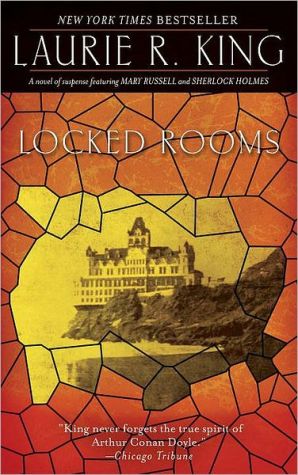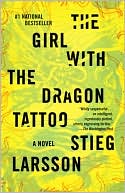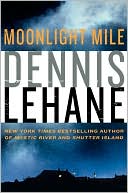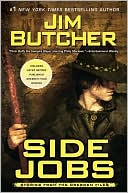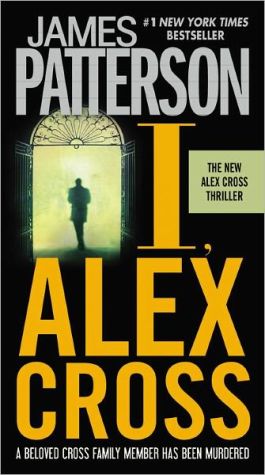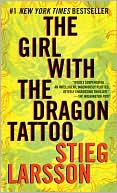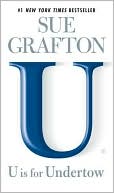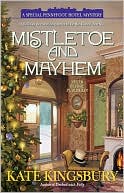Locked Rooms (Mary Russell Series #8)
En route to San Francisco to settle her family’s estate, Mary Russell, in the company of husband Sherlock Holmes, falls prey to troubling dreams—and even more troubling behavior. In 1906, when Mary was six, the city was devastated by a catastrophic earthquake. For years Mary has insisted she lived elsewhere at the time. But Holmes knows better.\ Soon it is clear that whatever unpleasantness Mary wanted to forget hasn’t forgotten her. A series of mysterious deaths leads Russell and Holmes from...
Search in google:
En route to San Francisco to settle her family’s estate, Mary Russell, in the company of husband Sherlock Holmes, falls prey to troubling dreams—and even more troubling behavior. In 1906, when Mary was six, the city was devastated by a catastrophic earthquake. For years Mary has insisted she lived elsewhere at the time. But Holmes knows better.Soon it is clear that whatever unpleasantness Mary wanted to forget hasn’t forgotten her. A series of mysterious deaths leads Russell and Holmes from the winding streets of Chinatown to the unspoken secrets of a parent’s marriage and the tragic “accident” that Mary alone survived. What Russell discovers is that even a forgotten past never dies . . . and it can kill again.Publishers WeeklyIn her last outing, The Game (2004), Mary Russell and her husband, Sherlock Holmes, traveled to India on a case of geopolitical significance, but in the richly imagined eighth novel in this acclaimed series, set in San Francisco in 1922, Russell undertakes a far more personal investigation. Since she began her journey back to her hometown-ostensibly to deal with her father's estate-Russell has been tormented by strange dreams, one of which involves the "locked rooms" of the title, and the sight of her San Francisco childhood home opens a flood of memories and emotions, most of which she's loathe to allow into her ber-rational mind. When someone takes a shot at her, Holmes enlists the help of Pinkerton agent Dashiell Hammett and Russell tries to unlock her past, in particular the "accident" that killed her family and left her an orphan in 1914. King's re-creation of San Francisco, especially the backstory during the devastating 1906 earthquake, is superb, and it's a pleasure to see the unusually competent Russell struggling with her own psyche. The plot may be a bit thin, but the narrative has real momentum, the characters are engaging and the prose, as always, is intelligent, evocative and graceful. Agent, Linda Allen. (June 21) Copyright 2005 Reed Business Information.
Chapter One\ Japan had been freezing, the wind that sliced through its famous cherry trees scattering flakes of ice in place of spring blossoms. We had set down there for nearly three weeks, after a peremptory telegram from its emperor had reached us in Hong Kong; people kept insisting that the countryside would be lovely in May.\ The greatest benefit of those three weeks had been the cessation of the dreams that had plagued me on the voyage from Bombay. I slept well--warily at first, then with the slow relaxation of defences. Whatever their cause, the dreams had gone.\ But twelve hours after raising anchor in Tokyo, I was jerked from a deep sleep by flying objects in my mind.\ Three days out from the island nation, the rain stopped and a weak sun broke intermittently through the grey. The cold meant that most of the passengers, after venturing out for a brief turn on the decks, settled in along the windows on the ship's exposed side like so many somnolent cats. I, however, begged a travelling-rug from the purser and found a deck-chair out of the wind. There, wrapped to my chin with a hat tugged down over my close-cropped hair, I dozed.\ Halfway through the afternoon, Holmes appeared with a cup of hot coffee. Actually, it was little more than tepid and half the liquid resided in the saucer; nonetheless, I sat up and disentangled one arm to receive it, then freed the other arm so that I could pour the saucer's contents back into the cup. Holmes perched on a nearby chair, taking out his pipe and tobacco pouch.\ "The Captain tells me that we are making good time," he commented.\ "I'm glad the storm blew itself out," I replied. "I might actually be able to face the dinner table tonight." Something about the angle of the wind the past days had made the perpetual pitch and toss of the boat even more quease-inducing than usual.\ "You haven't eaten anything in three days." Holmes disapproved of my weak stomach.\ "Rice," I objected. "And tea."\ "Or slept," he added, snapping his wind-proof lighter into life and holding it over the bowl of his pipe.\ That accusation I did not answer. After a moment, as if to acknowledge that his comment had not required a response, he went on.\ "Had you thought any more about pausing in Hawaii?"\ I stifled a yawn and put my empty cup onto the chair's wide arm, nestling back into the warmth of the rug. "It's up to you, Holmes. I'm happy to stop there if you like. How many days would it be before the next ship?"\ "Normally three, but it seems that the following ship has turned back to Tokyo for repairs, which means we could be marooned there for a week."\ I opened one eye, unable to tell from his voice, still less his smoke-girt expression, which way his desires leant. "A week is quite a long diversion," I ventured.\ "Particularly if Hawaii has embraced the austerities of Prohibition."\ "A half-day would mean a long walk and sit at a table where I don't have to aim a moving soup spoon at my mouth. Both would be quite nice."\ "Then another four days to San Francisco." The pointless, unnecessary observation was unlike Holmes. Indeed, this entire conversation was unlike him, I reflected, squinting at him against the glare. He had his pipe between his teeth, and was concentrating on rolling up the pouch, so I shut my eyes again.\ "Terra firma," I said. "A week in California, tying up business, and then we can turn for home. By train." I don't get seasick on trains.\ "A week will be sufficient, you believe?"\ "To draw up the papers for selling the house and business? More than enough."\ "And that is what you have decided to do."\ This noncommittal, pseudo-Socratic dialogue was beginning to annoy. "What are you getting at, Holmes?"\ "Your dreams."\ "What about them?" I snapped. I should never have told him about them, although it would have been difficult not to, considering the closeness of the quarters.\ "I should say they indicate a certain degree of anxiety."\ "Oh for heaven's sake, Holmes, you sound like Freud. The man had sex on the brain. 'Rooms in dreams are generally women,' he declares. 'A dream of going through a series of rooms indicates a brothel, or a marriage'--I can't imagine what his own marriage could have been like to equate the two so readily. And the key--God, you can imagine the fraught symbolism of playing with a key that lies warm in my pocket! 'Innocent dreams can embody crudely erotic desires.' The faceless man he'd no doubt equate with the male organ, and as for the objects that spurt wildly into the air--well, I'm clearly a sick woman. What does it say about my 'erotic desires' that reading the man's book made me need a hot bath? Or perhaps a cold shower-bath."\ "You sound as if you've researched this rather thoroughly."\ "Yes, well, I found a copy of his Interpretation of Dreams in the ship's library," I admitted, then realised that I was also admitting to a greater degree of preoccupation than I thought sensible. To lead him away from the admission, I said, "I wouldn't have thought that you of all people would fall for the Freud craze, Holmes."\ His face darkened as he came close to responding to my diversion, then he caught himself, and counterattacked with a deceptively mild, "A knowledge of psycho-logical jargon is hardly necessary when confronted with such an unambiguous statement such as that contained in those dreams of yours."\ "What do you mean, unambiguous?" I protested furiously, and too late realised that I had stepped into his own diversion with both feet.\ "San Francisco's earthquake, which sent things flying about, is clearly the paradigm for the first dream. And the locked rooms may represent your family's house, which has stood empty for ten years while you pretended it wasn't there."\ "A house is more often symbolic of the self," I told him, although I did not know why I wanted to argue.\ "True, although a house may also be simply a house."\ I threw off the rug so as to face him unencumbered. "Holmes, you're mad. I've only owned the place for three years, since I turned twenty-one, and I've been rather too busy to travel halfway across the world to take care of things. As for your earthquake fantasy, I wasn't even here in 1906. And what about the faceless man dream, anyway?"\ "There is as yet insufficient data to identify him," he said, not in the least troubled by my words.\ I drew breath to argue with him, but in the event, I couldn't be bothered. I rose with dignity, and said merely, "If you imagine we shall have time to uncover the relevant data in San Francisco, you are mistaken. We will be there only long enough for me to sign papers, then catch the train for New York."\ Tucking the rug under my arm, I left him to his pipe.\ Earthquakes. Ridiculous.\ He did not bring it up again, and neither did I, although over the following days I often felt his eyes upon me, and knew that at night he too lay awake, waiting for me to speak. But I did not, and he did not, and thus we traversed the Pacific. Between the dreams themselves and lying awake in dread, I scarcely slept, and began to feel as if I was walking in a wrap of cotton gauze.\ Hawaii was a pleasant interlude, although the wind blew and the wide beaches were nearly deserted. We walked for hours, and I even managed to eat something, but that night I slept no better.\ The following evening I wandered about the ship, up and down the various decks (trying to ignore the Freudian overtones of entering enclosed stairways) until I found myself at the furthest point of the ship, after which there was only water. The wind had stopped that morning, leaving the smoke from the stacks to trail straight back along the various layers of deck, which created a series of solitary if insalubrious places for meditation. I was on the last of those decks, with only a railing between me and the Pacific.\ And there I meditated, about the dreams and what Holmes had said.\ Clearly, I thought, the damage we had seen in Japan, with Tokyo still recovering from the previous year's devastating earthquake, had set the literalist idea of shaken objects into his mind. I was not worried about the possibility he had suggested; no, despite my words, it was the niggling fear that Freud might be right.\ Since leaving England in January, we had marked the ten-year anniversary of our meeting and the third year of marriage. I was content in ways I had not thought possible, well matched mentally and--despite the difference in our ages, despite the regular clash of our personalities, and despite the leering innuendo of Sigmund Freud--well suited physically, to a man who interested my intellect, challenged my spirit, and roused my passions.\ So, no: Psychology be damned--the dreams weren't about my marriage.\ Yet there they were, keeping me exhausted and irritable and searching out a piece of quiet if smoke-covered deck where I could stand by myself and stare down at the endless sea.\ The water stretched out as far as the eye could see in an expanse of gentle grey-blue swells broken only by the occasional white-capped wavelet and the line of the ship's passage, unrolling die-straight behind us until it faded into the glare of sun on the western horizon. Directly below where I stood, dominating my vision if I leant my upper body over the rail, the churn of the great screws dug an indentation in the surface, followed by a rise just behind. Like the earth from a farmer's plough, I thought dreamily, cutting a straight furrow across three thousand miles of sea. And when the ship reached the end of its watery field, it would turn and begin the next furrow, heading east; and after reaching that far shore it would shift again, ploughing west. Back and forth, to and fro, and all the while, beneath the surface the marine equivalents of earthworms and moles would be going busily about their work, oblivious of the other world above their heads. The farmer, the ship, above; the insect, the fish, below. So peaceful. Peacefully sleeping, while occasionally a seed would fall and take root in the freshly split furrow . . .\ "Russell!" Holmes exclaimed, and the sharp voice and his sudden hand on my arm snatched me awake and sent my hat flying. I grabbed at it, but too late; the scrap of felt sailed out behind the ship, floating on the air for a long time until eventually it planted itself into the brine furrow. I turned to my husband.\ "Why did you have to startle me like that?" I complained. "That was my last warm hat."\ "Easier to purchase another hat than to fish you out of the sea," he said. "You were on the edge of going over."\ "Don't be ridiculous, Holmes, I was just watching the patterns made by the propellers. What did you want, anyway?"\ "The first bell for dinner went a bit ago. When you didn't come to dress I thought perhaps you hadn't heard it. And when I came down the stairs, it appeared as though you were trying to throw yourself over."\ His laconic words bore just the slightest edge of true concern, as if a question lay behind them. I reached up to adjust my hair-pins, only to find them gone--weeks after chopping off my thick, waist-length hair (a necessary element of disguising myself as a British officer) my hand was still startled to find the weight of it missing from my head. Spreading my fingers instead to run them through the brief crop, I glanced back at the straight path laid out behind us, and felt a shudder play up my spine. Perhaps I shouldn't lean over any more rails while I was as tired as this, I told myself, and allowed Holmes to thread my hand through his arm and lead me back towards our cabins.\ I picked at my meal, making no more response to the conversations around me than would a stone statue. Afterwards we listened to the ship's string quartet render a competent selection of Beethoven, and took a turn around the decks, Holmes chatting, me unresponsive. Eventually we took ourselves to bed, for another night's broken sleep.\ The next morning the mirror showed a woman with stains beneath her eyes. Holmes had already risen, and I dressed slowly, drank several cups of strong coffee, and took a book up onto the sun-drenched deck. The pages, however, made no more sense than the conversations of the night before, and eventually I merely sat, staring at the almost imperceptible horizon of sky and sea.\ After some time I became aware that Holmes had settled into the adjoining chair. My gaze came reluctantly back from the distance and settled onto the bit of brightness he held in his hand. It was, I decided, the silken scarf he had purchased in a bazaar on the first leg of our voyage out from England, a garish item perhaps useful for one of his gipsy disguises. He held it in his hands as if its bright dye bore a hidden message; it was his focussed concentration that finally caught my attention.\ "What is that, Holmes?"\ "The length of silk we bought in Aden. I thought to use it as an aide-memoire, to bring back the details of that curious afternoon. The whole affair puzzles me still."\ Recalling the events of Aden was something of a wrench, since so much had taken place in the intervening months--weeks in India tracking down a missing spy and jousting with a mad maharaja, followed by the better part of a month in Japan with all the complexity of events there, interspersed by the dream-plagued weeks at sea. Granted, we had nearly been killed in the Aden bazaar by a balcony falling on our heads, but near-death experiences were no rarity in my life with Holmes. I had in the end dismissed it as a curious series of events that might have had tragic consequences, and fortunately had not. Clearly, Holmes was not of the same mind.\ "It had to have been an accident, Holmes," I objected. "The balcony fell because the bolts were old, not because someone tried to pull it down on our heads."\ "So I tell myself."\ "But yourself will not listen."\ "A lifetime's habit of self-preservation leaves one disinclined to accept the idea of coincidence."\ "Holmes, one event does not a coincidence make."\ "But two oddities catch at the mind."\ "Two?"\ "The fallen balcony, and the ship's passenger who enquired about us, then disembarked. In Aden." He raised an eyebrow at me to underscore the importance of that last.\ From the Hardcover edition.
\ From Barnes & NobleIt's 1924: Strong-willed sleuth Mary Russell and her husband, the ever-observant Sherlock Holmes, have completed a perilous Indian mission (recorded in The Game). Yearning for quieter occupations, they steam halfway around the world to San Francisco, Mary's childhood home, to settle some legal matters about her family's estate. All the dull paperwork evaporates, however, after a series of troubling dreams offers the first key to a tantalizing locked-room mystery.\ \ \ \ \ Publishers WeeklyIn her last outing, The Game (2004), Mary Russell and her husband, Sherlock Holmes, traveled to India on a case of geopolitical significance, but in the richly imagined eighth novel in this acclaimed series, set in San Francisco in 1922, Russell undertakes a far more personal investigation. Since she began her journey back to her hometown-ostensibly to deal with her father's estate-Russell has been tormented by strange dreams, one of which involves the "locked rooms" of the title, and the sight of her San Francisco childhood home opens a flood of memories and emotions, most of which she's loathe to allow into her ber-rational mind. When someone takes a shot at her, Holmes enlists the help of Pinkerton agent Dashiell Hammett and Russell tries to unlock her past, in particular the "accident" that killed her family and left her an orphan in 1914. King's re-creation of San Francisco, especially the backstory during the devastating 1906 earthquake, is superb, and it's a pleasure to see the unusually competent Russell struggling with her own psyche. The plot may be a bit thin, but the narrative has real momentum, the characters are engaging and the prose, as always, is intelligent, evocative and graceful. Agent, Linda Allen. (June 21) Copyright 2005 Reed Business Information.\ \ \ Library JournalTormented by recurring nightmares, Mary Russell (The Game) returns to San Francisco after a ten-year absence. She swears to husband Sherlock Holmes that she wasn't in the city during the 1906 fire, but events soon prove her wrong. What memories is she hiding from herself? Holmes suspects they are connected somehow to the terrible car crash that claimed the lives of Russell's father, mother, and younger brother in 1915. With his normally capable wife distracted by her emotions, it is up to Holmes to recruit new Irregulars and uncover the truth behind the "locked rooms" that Russell dreams about. This latest title in King's Russell/Holmes series is steeped in the period feel of 1920s San Francisco. Two points of view (first person from Russell and third person from Holmes) add to the richness of the prose and the complexity of the storyline. Worthy of the highest recommendation and suitable for all public libraries. [See Prepub Alert, LJ 3/1/05]-Laurel M. Bliss, Princeton Univ. Lib., NJ Copyright 2005 Reed Business Information.\ \ \ \ \ School Library JournalAdult/High School-Sherlock Holmes and Mary Russell are at it again. Having just traveled to India in The Game (Bantam, 2004), they are stopping in San Francisco, Mary's hometown, before returning to England. It is 1930, 24 years after the great earthquake and 10 years since the death of Mary's brother and parents, and her removal to Anglia. Ostensibly, she is going to wrap up some business interests and sell her parents' house, but she soon becomes aware of strange goings-on there and what seem to be attempts on her life. This is a more character-driven title than many of the previous Russell/Holmes outings, and Mary's emotions and fears are in the forefront. The story is told in alternating sections, by Mary in the first person and from Holmes's point of view in the third. This tale is self-contained, but does explain Mary's origins and probes many secrets she has kept hidden, even from herself. Along with a fascinating story, teens will be introduced on a very personal level not only to the San Francisco of that frightening earthquake, but also to the various social and racial striations so important even into the 1930s. Fans of this series will not be disappointed and newcomers may be intrigued enough to start from the beginning.-Susan H. Woodcock, Fairfax County Public Library, VA Copyright 2005 Reed Business Information.\ \
